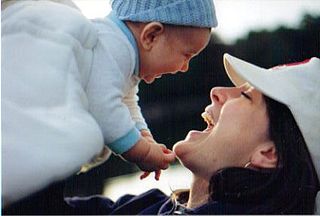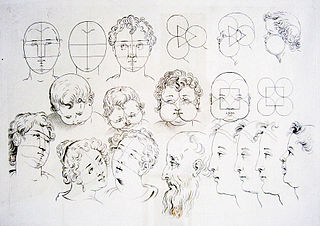Related Research Articles

Robopsychology is the study of the personalities and behavior of intelligent machines. The term was coined by Isaac Asimov in the short stories collected in I, Robot, which featured robopsychologist Dr. Susan Calvin, and whose plots largely revolved around the protagonist solving problems connected with intelligent robot behaviour. The term has been also used in some academic studies from the field of psychology and human–computer interactions, and it refers to the study of the psychological consequences of living in societies where the application of robotics is becoming increasingly common.

The uncanny valley effect is a hypothesized psychological and aesthetic relation between an object's degree of resemblance to a human being and the emotional response to the object. Examples of the phenomenon exist among robotics, 3D computer animations and lifelike dolls. The increasing prevalence of digital technologies has propagated discussions and citations of the "valley"; such conversation has enhanced the construct's verisimilitude. The uncanny valley hypothesis predicts that an entity appearing almost human will risk eliciting eerie feelings in viewers.
In psychoanalytic theory, a defence mechanism is an unconscious psychological operation that functions to protect a person from anxiety-producing thoughts and feelings related to internal conflicts and outer stressors.

Daydreaming is a stream of consciousness that detaches from current, external tasks when attention drifts to a more personal and internal direction.
Rational emotive behavior therapy (REBT), previously called rational therapy and rational emotive therapy, is an active-directive, philosophically and empirically based psychotherapy, the aim of which is to resolve emotional and behavioral problems and disturbances and to help people to lead happier and more fulfilling lives.
Theoretical psychology is concerned with theoretical and philosophical aspects of psychology. It is an interdisciplinary field with a wide scope of study.
Insight is the understanding of a specific cause and effect within a particular context. The term insight can have several related meanings:

Affect, in psychology, is the underlying experience of feeling, emotion, attachment, or mood. It encompasses a wide range of emotional states and can be positive or negative. Affect is a fundamental aspect of human experience and plays a central role in many psychological theories and studies. It can be understood as a combination of three components: emotion, mood, and affectivity. In psychology, the term affect is often used interchangeably with several related terms and concepts, though each term may have slightly different nuances. These terms encompass: emotion, feeling, mood, emotional state, sentiment, affective state, emotional response, affective reactivity, disposition. Researchers and psychologists may employ specific terms based on their focus and the context of their work.
The biology of romantic love has been explored by such biological sciences as evolutionary psychology, evolutionary biology, anthropology and neuroscience. Specific chemical substances such as oxytocin and dopamine are studied in the context of their roles in producing human experiences, emotions and behaviors that are associated with romantic love.

Roy Frederick Baumeister is an American social psychologist who is known for his work on the self, social rejection, belongingness, sexuality and sex differences, self-control, self-esteem, self-defeating behaviors, motivation, aggression, consciousness, and free will.

Fear of flying is a fear of being on an airplane, or other flying vehicle, such as a helicopter, while in flight. It is also referred to as flying anxiety, flying phobia, flight phobia, aviophobia, aerophobia, or pteromerhanophobia.
Steffen Landgraf is a former German long jumper / decathlete and an active scientist in forensic psychiatry and clinical neuroscience.
Relief is a positive emotion experienced when something unpleasant, painful or distressing has not happened or has come to an end.
Functional Ensemble of Temperament (FET) is a neurochemical model suggesting specific functional roles of main neurotransmitter systems in the regulation of behaviour.

Facial width to height ratio (fWHR) is a measure of the width of a person’s face compared to its height. Research has shown that higher FWHR is associated with various physical and behavioral traits, such as adolescent testosterone, aggression, attractiveness to women, cause of death by violence, CEO success as measured by organizational and financial performance, and success in sports. While most studies have found some significance, other studies found little correlation. The metric has also been used in primate studies with similar findings.
Anelis Kaiser is professor of gender studies at MINT, University of Freiburg, Germany. She is also on the lecturer within the social psychology and social neuroscience department at the University of Bern, Switzerland. Along with Isabelle Dussauge, Kaiser was a guest editor of a special issue on Neuroscience and sex/gender of the journal Neuroethics, they also co-founded The NeuroGenderings Network together.

Marcantonio M. Spada is an Italian-British academic psychologist who has studied the role of metacognition in addictive behaviours and operationalised the constructs of "desire thinking" and the "COVID-19 anxiety syndrome". He is currently Professor of Addictive Behaviours and Mental Health and Dean of the School of Applied Sciences at London South Bank University. He is also editor-in-chief of Addictive Behaviors.
The traumagenic neurodevelopmental (TN) model of psychosis synthesizes current knowledge of biological and psychological processes to describe the relationship between childhood trauma and psychosis. Proposed in 2001, the TN model suggests increased stress sensitivity observed among individuals experiencing psychotic symptoms may be attributed to trauma-induced neurodevelopmental changes during key developmental periods. Proposed as a partial explanation for the association between childhood adversity and psychosis, the TN model suggests observed increases in stress reactivity among individuals diagnosed with psychotic disorders may be attributed to trauma-induced neurological changes during sensitive developmental periods. As a result, the TN model underscores the importance of routine comprehensive assessments of childhood trauma histories when evaluating individuals presenting with psychotic symptoms for mental health services.
Do-gooder derogation is a phenomenon where a person's morally motivated behavior leads to them being perceived negatively by others. The term "do-gooder" refers to a person who deviates from the majority in terms of behavior, because of their morality.
Food psychology is the psychological study of how people choose the food they eat, along with food and eating behaviors. Food psychology is an applied psychology, using existing psychological methods and findings to understand food choice and eating behaviors. Factors studied by food psychology include food cravings, sensory experiences of food, perceptions of food security and food safety, price, available product information such as nutrition labeling and the purchasing environment. Food psychology also encompasses broader sociocultural factors such as cultural perspectives on food, public awareness of "what constitutes a sustainable diet", and food marketing including "food fraud" where ingredients are intentionally motivated for economic gain as opposed to nutritional value. These factors are considered to interact with each other along with an individual's history of food choices to form new food choices and eating behaviors.
References
- ↑ Trip, Simona; Bora, Carmen Hortensia; Marian, Mihai; Halmajan, Angelica; Drugas, Marius Ioan (6 March 2019). "Psychological Mechanisms Involved in Radicalization and Extremism. A Rational Emotive Behavioral Conceptualization". Frontiers in Psychology. 10: 437. doi: 10.3389/fpsyg.2019.00437 . PMC 6414414 . PMID 30894828.
- ↑ McCauley, Clark; Moskalenko, Sophia (April 2017). "Understanding political radicalization: The two-pyramids model". American Psychologist. 72 (3): 205–216. doi: 10.1037/amp0000062 . PMID 28383974.
- ↑ Bergen, Peter (14 June 2016). "Opinion | Why Do Terrorists Commit Terrorism?". The New York Times.
- ↑ Trip, Simona; Bora, Carmen Hortensia; Marian, Mihai; Halmajan, Angelica; Drugas, Marius Ioan (6 March 2019). "Psychological Mechanisms Involved in Radicalization and Extremism. A Rational Emotive Behavioral Conceptualization". Frontiers in Psychology. 10: 437. doi: 10.3389/fpsyg.2019.00437 . PMC 6414414 . PMID 30894828.
- ↑ Bergen, Peter (14 June 2016). "Opinion | Why Do Terrorists Commit Terrorism?". The New York Times.
- ↑ Muro, Diego (December 2016). "What does Radicalisation Look Like? Four Visualisations of Socialisation into Violent Extremism". CIDOB: Notes Internacionals. Retrieved 29 February 2020.
- ↑ Trip, Simona; Bora, Carmen Hortensia; Marian, Mihai; Halmajan, Angelica; Drugas, Marius Ioan (6 March 2019). "Psychological Mechanisms Involved in Radicalization and Extremism. A Rational Emotive Behavioral Conceptualization". Frontiers in Psychology. 10: 437. doi: 10.3389/fpsyg.2019.00437 . PMC 6414414 . PMID 30894828.